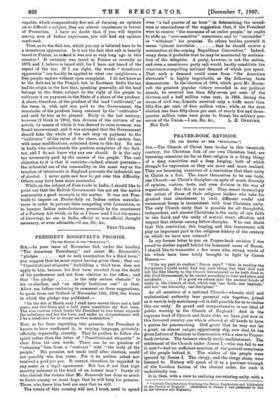PRESIDENT ROOSEVELT'S PROMISE.
(To TEE EDITOR 07 THE "SPECTATOR."]
StR,—In your issue of November 2nd, under the heading "The American Presidency," and anent Mr. Roosevelt's " pledgee not to seek nomination for a third term,"
you suggest that he must regret having given them ; that our
"Constitutional etiquette" forbidding a third term does not apply to him, because his first term resulted from the death of his predecessor and not from election to the office; and that "his pledge is the only serious obstacle " to his re-election, and "an utterly factitious one" at that. Allow me, before venturing to comment on these suggestions, to quote from our Outlook of November 12th, 1904, the terms in which the pledge was published:—
" On the 4th of March next I shall have served three and a half years, and this three and a. half years constitute my first term. The wise custom which limits the President to two terms regards the substance and not the form, and under no circumstances will I be a candidate for or accept another nomination."
Now, so far from regretting this promise, the President is known to have confirmed it, in varying language, privately, officially, repeatedly, recently. That he prefers to follow the spirit rather than the letter of " Constitutional etiquette" is clear from his own words. There can be no question of "releasing" 'him from a "contract" with "the body of the people." His promise, not made until after election, could not possibly win him votes. For it he neither asked nor received a quid pro quo. It cannot, therefore, be regarded in any sense as a legal agreement. But has it not that high sanctity inherent in the word of an honest man ? Surely all who cherish the virtues that Mr. Roosevelt has done so much to foster among us must hope that be will keep his promise. Those who know him best are sure that he will.
The voters of this country will not, I trust, need to spend even ." a bad quarter of an hour" in determining. the. sound ness or unsoundness of the suggestion that, if the President were to receive "the summons of an entire people,".he ought to stifle an "over-sensitive" conscience, and to " reconsider " or " withdraw " his promise. To others besides yourself it seems "almost inevitable that he should receive a nomination at the coming Republican Convention.". Indeed, many deem it probable that he may be nominated by acclama- tion of the delegates. A party, however, is not the nation, and even a unanimous party call would hardly constitute the conscience-compelling national demand of which you speak. That such a demand could come from " the American electorate" is highly improbable, as the following facts demonstrate. In the election of 1904, which gave Mr. Roose- velt the greatest popular victory recorded in our political- annals, he received less than . fifty-seven per cent. of the thirteen and a half million votes cast; in 1864, during the stress of civil war, Lincoln received only a trifle more than fifty-five per cent. of four million votes ; while at the next election less than fifty-three per cent. of nearly five and three- quarter million votes were given to Grant, the military pre-
server,of the Union.—I am, Sir, &c., L. E. OPDYCKE. New York.










































































 Previous page
Previous page